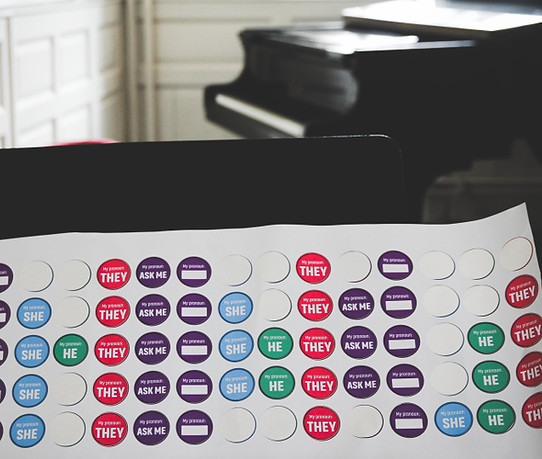2018 Maynooth
Queerness, Voice, Embodiment
2nd Annual Symposium of the LGBTQ+ Music Study Group
20th - 21st April 2018, Maynooth University

Call for Papers
Elizabeth Woods’ essay ‘Sapphonics’ (1994) set in motion new discourses on the voice in music studies. With an example of the unique expressive qualities of lesbian difference and desire, Sapphonics questions the universally assumed traits of physical vocal mechanisms to emphasise the particular embodied circumstances of production and performance. Grappling with similar questions of difference and agency, Gayatri Spivak’s ‘Can the Subaltern Speak?’ (1988) articulated the predicament of Subaltern voices addressing issues of (post)coloniality and patriarchy. Neither essay delimits the possibilities of what voicing entails, rather both cut across disciplinary boundaries in search of voices that intersect various dimensions of identity, including gender, sexuality, race, class, caste, to name a few.
This Symposium, the second of the LGBTQ+ Music Study Group, revisits questions of voice to open dialogue in music studies on the many in/visible mechanisms affecting the voices of the marginalised in music disciplines. What are queer voices? Who speaks for and of whom? How do voices inscribe or limit agency of LGBTQ+ subjects? As LGBTQ+ politics become more mainstream, what other voices are left unheard? In addition to paper presentations, the symposium will include a panel on the subject of ‘LGBTQ+ Identities, ethnicities and nationalism in Irish and UK contexts,’ and a roundtable discussion of mental health and the LGBTQ+ community in university music departments. We welcome proposals for individual 20-minute presentations, shorter provocations, organised 60-minute panels and roundtable discussions that draw on and expand on music and the following themes:
-
Queer of colour critique and further intersections of race, ethnicity, class, disability, caste
-
Queerness, the body and embodiment
-
Voice and trans experiences
-
Queer approaches to early music and apparently heteronormative contexts
-
Irish LGBTQ+ communities
-
Queerness, religion and spirituality
-
Embodying queerness in research and teaching
-
LGBT activism, homonationalism, LGBT imperialism

Report
The symposium “Queerness, Voice, Embodiment” took place from 20th to 21st April 2018 at Maynooth University. It was the second annual symposium of the LGBTQ+ Music Study Group, an organization established in 2016 to bring together scholars of different disciplinary and sub-disciplinary backgrounds interested in music, gender and sexuality. Through a range of formats, the symposium elicited queer and feminist perspectives on musical performance, and raised broader issues of LGBTQ+ politics as well as diversity and wellbeing in contemporary higher education.
The critical poise of the symposium was set by the keynote speaker, Liam Lillis Ó Laoire (NUI Galway), who beautifully weaved together reflections on whiteness, gender and sexuality through inspecting Irish folk music in contemporary, multi-ethnic Ireland. Further explorations of Irish contexts were offered through a panel featuring Moynagh Sullivan (Maynooth University), who proposed alternative queer and feminist Irish-British pop music lineages, and the cabaret and burlesque performer Shir Madness, who offered a critique of cultural appropriation in burlesque performance. Issues of coloniality were addressed in a study of queer Cuban dance by Moshe Morad (Tel Aviv University) and an analysis of the South African artist Umlilo by Ernst van der Wal (Stellenbosch University/Humboldt University of Berlin). The organised panel on falsetto, countertenors and male sopranos by Michael Arshagouni, Robert Crowe and Morgan Crowley, explicitly explored the voice. The theme of embodiment was approached in different guises, such as through a study of lip-syncing in RuPaul’s Drag Race by Manuel Pinto (University of Groeningen) and reflections on gendering in ballet education in the UK by Jonathan Still (UCL Institute of Education). Meanwhile, Marion Wasserbauer’s (University of Antwerp) spotlighted queer subjectivities through her creative oral history project “Queer Voices”. Ethnographic methods also informed the work of David Buschmann (University of Bern), who presented on issues of safe spaces in Berlin queer clubs. Several presenters offered analyses of queer identifying artists, such as the US pop star Annie Clarke by Megan Rogerson-Berry (Waikato Institute of Technology, Hamilton). To compliment, Magdalena Fürnkrantz (University of Music and Performing Arts Vienna) uncovered new perspectives on jazz musicians of the Harlem renaissance, continuing a tradition of revealing hidden LGBT histories.
Another key focus of the symposium was issues of health and wellbeing in light of statistics that reveal higher levels of depression, anxiety, self-harm and suicide among LGBTQ people. This was addressed in a roundtable on mental health featuring two students, lecturers, a head of department, and welfare and equality officers from Irish and UK universities. The speakers offered their own insights into, and strategies for dealing with the marked rise in mental health issues amongst students and staff and urged for the implementation of new policies at institutional level.
Overall, the symposium was a huge success. Participants hailed from numerous countries – including South Africa, New Zealand, the USA, Austria, Israel, and the Netherlands – demonstrating the expansion of the Study Group network. The careful curation of the event by the programme committee and host Danielle Sofer, created a supportive and jovial atmosphere, promoted critical discussions, and engendered a strong sense of politics. Through the diverse participants, contributions and formats, the symposium continued the Study Group’s role as an academic forum with activist and outreach aspirations. The Study Group committee would like to thank all the student helpers and our funders, including the British Forum for Ethnomusicology, the Royal Musical Association, the Society for Musicology in Ireland and Maynooth University. Participants at the symposium were shocked and saddened to hear of the death of David Buschmann just weeks after having presented at the event. The Study Group offers our sincere condolences to his family and friends.
Check out the programme, abstracts, a full report, and photos, below:



















